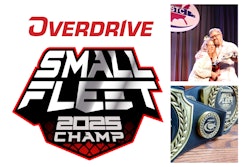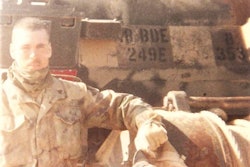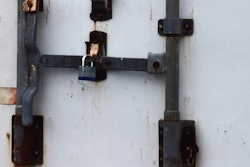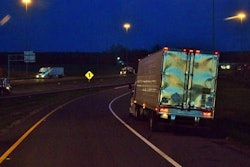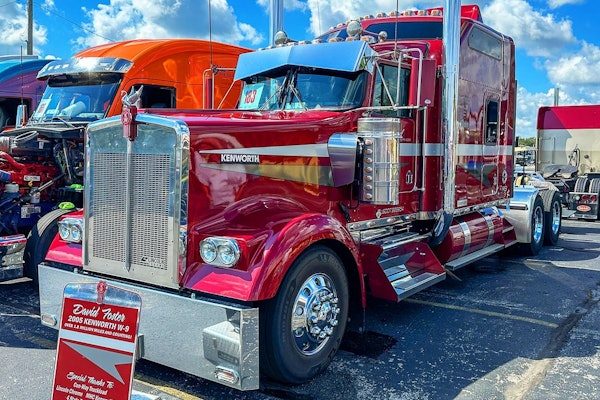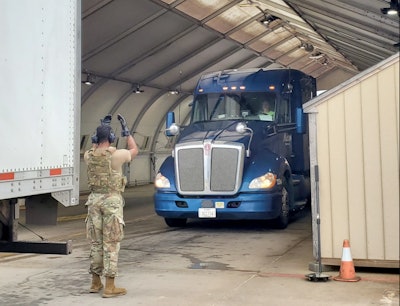
Previously in this two-part feature: Driver held at gunpoint, cargo pilfered: How to avoid being an easy mark in dangerous times
It's the middle of the night, you're in the sleeper parked over-the-road when you hear that dreaded sound of some thief attempting to force entry into the trailer. What, in this moment, do you reach for, driver? A gun, or a phone?
Aiden Hammond, a small fleet owner-operator leased on with Greatwide Truckload Management, hauling almost exclusively military freight from his home base in Iowa, does carry a gun in the cab, but said he wouldn't reach for it if he heard someone rummaging around his trailer.
"Ninety percent of everything I actually haul is military-related. It’s explosives, it’s triggers, powder, shells, things of that nature," said Hammond. "My relationship to security is that I choose not to. If you're stupid enough to go back there, that's your problem. I've had people actually break into my trailer that was loaded with bombs. That's happened many, many, many times, and my thing is, 'good luck.'"
He knows better than to treat the trailer as some extension of his own personal safety -- what the firearm he carries is for. "Don’t panic, don’t lose your life over it, just make that phone call," he said.

However a threat emerges, whether inside job or random trailer break-in, do you know who to call?
If you don't, get your contingency plan in place sooner rather than later. Yet know you're not alone. Travelers Insurance cargo theft investigations lead Scott Cornell asked that question, and for a show of hands, to a roomful of fleet-safety/security personnel earlier this week at the Truckload Carriers Association's Safety & Security Division conference in Nashville, Tennessee. Just a couple hands went up.
As an explosives hauler, owner-operator Hammond's in a unique position. In addition to his leasing carrier, he's got an unusually powerful ally watching his back when thieves break in: the U.S. military.
Hammond, who grew up in Jersey City, New Jersey, and has now racked up 42 years in the industry, knows how to pick his battles. "When people choose to steal, they’re gonna find a way," he said. "All the safety gadgets and the locks don't matter. If they wanna get in there they’re gonna get in there."
[Related: High-security munitions hauling: Bigger investment at start-up can mean rich rewards]
Indeed most safety and security-related products over the last few decades have undergone a humbling rebrand. Bulletproof vests now sell as bullet-resistant, waterproof watches as water-resistant, and any informed consumer of locks and security devices knows well better than to take manufacturer guarantees as gospel. With locks, the informed calculation might be not whether it can be picked/broken but just how long it takes to defeat it.
"At the end of the day there’s nothing you can do if the person wants to go pick up one of those shells," said Hammond. "I’m gonna call the authorities and they’re gonna come and do their investigation," which can become as involved as finding fingerprints and DNA samples. Though Hammond says that every single time his trailer has been busted into, "the person was caught immediately," and he's never tried to confront anyone on his own.
"It’s just a perspective you learn from DOD," he said. "There's nothing you can do. All you've got to do is hit the panic button. ... When you’re hauling arsenal, if you fall off a route they’re going to ask if you’re all right, and if you don’t answer the call and go off route they’re going to send someone out, no ifs ands or buts about it."
Hammond also credits his compensation structure for reassurance when security breaches happen, saying even if he stops for a prolonged period, he's "getting paid for every minute."
With Hammond set to clear a half million in income this year with the five trucks he runs, a lot of it on the back of $25,000 wintertime loads from Oak Harbor, Washington, headed to Virginia, it seems it pays to outsource law enforcement to trained professionals with nothing else on their plate.
[Related: Navigating gun laws for truckers]
When danger's an inside job
There's an old horror story from before Caller ID about a babysitter who keeps getting creepy phone calls asking about the kids. She eventually calls the police, who trace the call and gravely inform her "the call is coming from inside the house."
The tale reminds us that the vast majority of crime occurs between people who know each other. While we may spend most of our lives worried about "bad guys" attacking and exterior invading forces, almost all children kidnapped are taken by a parent or someone close. Almost all married people murdered are killed by their spouses. Money missing from your wallet? Check with your teenage son before posting wanted ads.
Owner-operator Margaret Consentino knows this all too well, and in fact hauls in a 2016 Freightliner Cascadia that serves as a constant memento from a trucking business gone wrong, felled from within by unscrupulous employees rather than from without by burglars. Consentino, who goes by Big Rig Marg, briefly worked for a trucking company that went broke thanks to a few disastrous hires, leading her to take over the payments on the Cascadia to continue operating out of her native Southern California as a one-truck independent.
Prior to that company's failure, Consentino hauled mail in team-driving operations for the postal service, at a time when the small company was pulling drivers out of a school. Many "turned out to be felons, though they were supposed to be checked," she said.
Team training, something other female operators have highlighted as a real personal-security risk factor, Consentino said she once witnessed a driver in training "throwing cigarette butts out the window in the middle of a windstorm in Texas," which she says started a major fire.
She held her anger in check, called the authorities and her dispatch, and headed back for California.
[Related: On the darker side of trucking social media, and making a difference]
On another occasion, she recalled, she was tasked with handling another student driver, known for reckless all-night gambling outings, who took home his assigned tractor and trailer, only to then steal it and have it parted out in the desert.
Overdrive spoke to a former owner of that trucking company, who couldn't verify the exact details of those two incidents, but did say Consentino "was the best we had and I trusted her implicitly. Anything she tells you probably happened."
The owner found himself out of business and in bankruptcy within two years, his view of trucking soured by experiences with unsavory characters all around the industry. Consentino, he wagered, "could probably write a book on all the things she’s seen."
Big Rig Marg herself has mostly avoided the worst hazards of trucking, saying she's never been personally assaulted or threatened while working. She credits her family's background in the business, solid training, and lack of ego drive as reasons for her success.
"I stay to myself. I sleep in my truck unless I go to a motel," she said, blending into the crowd in others ways, too. "I don’t wear showy things. My truck is very plain. It's not uncommon to see drop-dead gorgeous women out here, but it’s not a good option. You need to keep your eyes and ears and effects dressed down -- who cares how you look?" She might be drop-dead gorgeous herself, she said, but "out here on the road I look like warmed-over dog" leavings.
Big Rig Marg said she grosses $3,000 a week and keeps her truck at a steady 65 mph to save on fuel. Like Hammond, when trouble knocks, she simply picks up a phone, and says her career is better for it.
[Related: Cargo theft trends: With Scott Cornell and the Travelers Insurance sting trailer]

